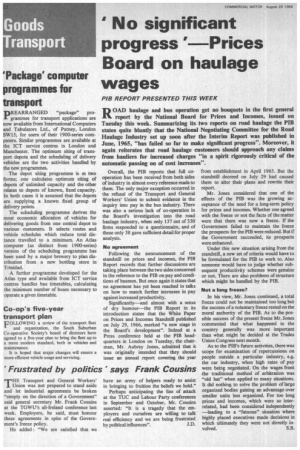No significant progress '—Prices Board on haulage wages
Page 24

If you've noticed an error in this article please click here to report it so we can fix it.
PIB REPORT PRESENTED THIS WEEK ROAD haulage and bus operation get no bouquets in the first general report by the National Board for Prices and Incomes, issued on Tuesday this week. Summarizing its two reports on road haulage the PIB states quite bluntly that the National Negotiating Committee for the Road Haulage Industry set up soon after the Interim Report was published in June, 1965, "has failed so far to make significant progress". Moreover, it again reiterates that road haulage customers should approach any claims from hauliers for increased charges "in a spirit rigorously critical of the automatic passing on of cost increases".
Overall, the PIB reports that full cooperation has been received from both sides of industry in almost every reference made to them. The only major exception occurred in the refusal of the Transport and General Workers' Union to submit evidence in the inquiry into pay in the bus industry. There was also a serious lack of co-operation in the Board's investigation into the road haulage industry, when only 137 out of 330 firms responded to a questionnaire, and of these only 38 gave sufficient detail for proper analysis.
No agreement
Following the announcement of the standstill on prices and incomes, the NB Report records that further discussions are taking place between the two sides concerned in the reference to the PIB on pay and conditions of busmen. But once again it states that no agreement has yet been reached in talks on how to match further increases in pay against increased productivity.
Significantly—and almost with a sense of dry humour—the PIB Report in its introduction states that the White Paper on Prices and Incomes Standstill published on July 29, 1966, marked "a new stage in the Board's development". Indeed at a Press conference held at the NB headquarters in London on Tuesday, the chairman, Mr. Aubrey Jones, admitted that it was originally intended that they should issue an annual report covering the year
from establishment in April 1965. But the standstill decreed on July 29 had caused them to alter their plans and rewrite their report.
Mr. Jones considered that one of the effects of the PIB was the growing acceptance of the need for a long-term policy for prices and incomes. Whether one agreed with the freeze or not the facts of the matter were that there was now a freeze. If the Government failed to maintain the freeze the prospects for the PIB were reduced. But if the Government succeeded, its prospects were enhanced.
Under this new situation arising from the standstill, a new set of criteria would have to be formulated for the PIB to work to. Also someone would have to judge whether subsequent productivity schemes were genuine or not. There are also problems of structure which might be handled by the PIB.
Not a long freeze?
In his view, Mr. Jones continued, a total freeze could not be maintained too long but the success of a voluntary freeze rested on the moral authority of the PIB. As to the possible success of the present freeze Mr. Jones commented that what happened in the country generally was more important than what might be decided at the Trades Union Congress next month.
As to the PIB's future activities, there was scope for examination of repercussions on people outside a particular industry, e.g. the car industry, when high rates of pay were being negotiated. On the wages front the traditional method of arbitration was "old hat" when applied to many situations. It did nothing to solve the problem of large organized bodies gaining an advantage over smaller units less organized. For too long prices and incomes, which were so interrelated, had been considered independently —leading to a "fatuous" situation where highly placed executives made decisions in which ultimately they were not directly in
volved. S.B.




















































































































